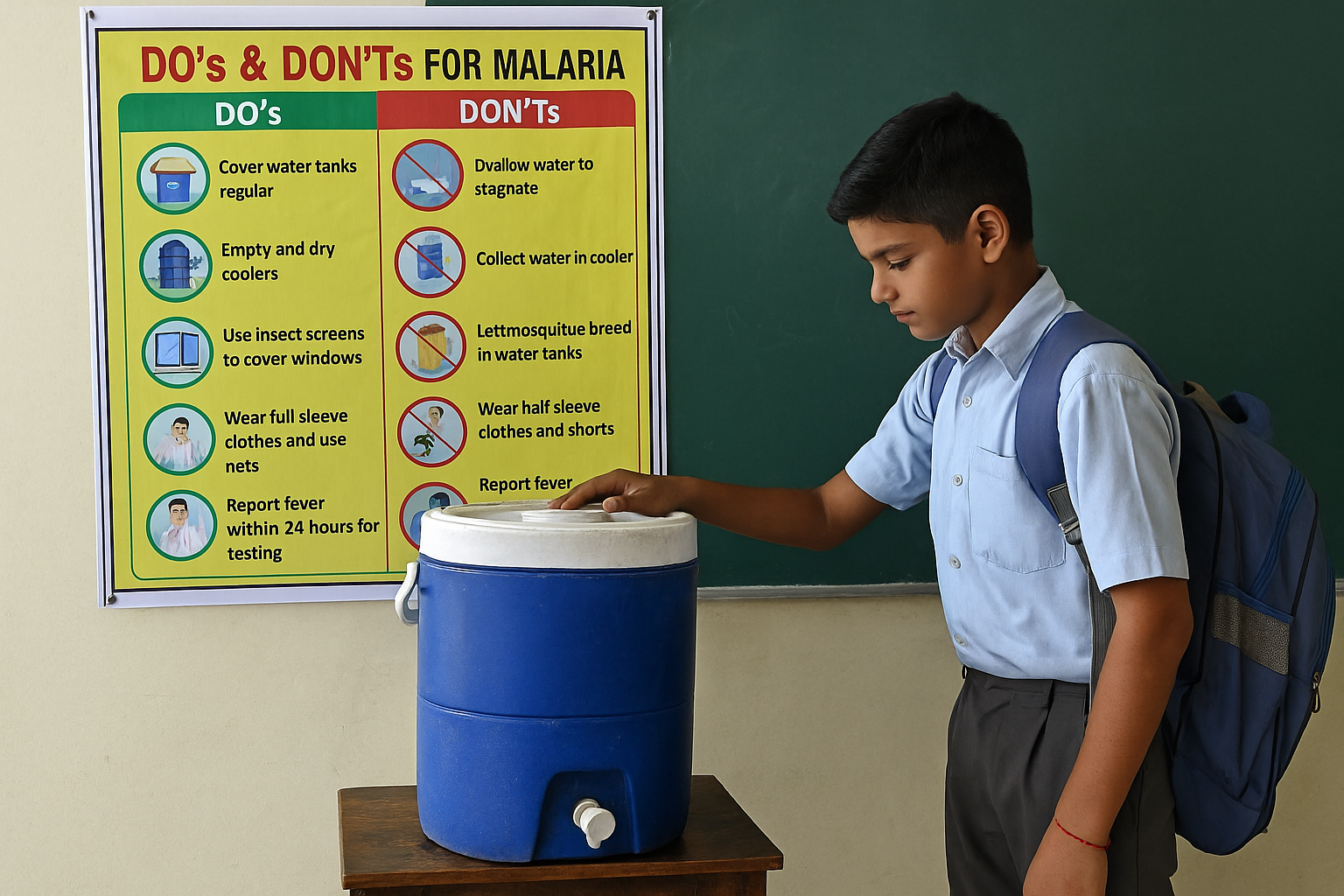New Directive from Education Department to Pre-Empt Vector-Borne Diseases
As Delhi braces for the onset of the monsoon, the city’s Directorate of Education (DoE) has rolled out a proactive, city-wide campaign across schools by designating June as ‘Anti-Malaria Month.’ The move is part of a focused public health initiative to curb the spread of mosquito-borne diseases such as malaria, dengue, and chikungunya in the coming rainy season.
The circular, issued to all government, private, and municipal schools, mandates heightened surveillance, cleanliness drives, and awareness-building activities during school hours.
What Schools Are Being Asked to Do
In its directive, the DoE outlines a detailed action plan to make campuses mosquito-free zones. Key components include:
- Daily inspections of school premises for stagnant water, especially in water coolers, pots, AC trays, tanks, and open containers.
- Covering all water-holding units with lids or mesh screens.
- Deployment of awareness materials: Posters with “Do’s and Don’ts,” teacher-led educational talks, and student-led campaigns.
- Record keeping and monitoring, with school heads responsible for maintaining checklists and compliance logs.
Health and Education Officials Stress Early Prevention
According to a senior DoE official, the initiative is not just precautionary, but aligned with India’s broader target to eliminate malaria by 2030 under the National Vector Borne Disease Control Programme (NVBDCP).
“Schools are community hubs. Educating students means educating families. This is an ecosystem-wide prevention drive,” the official stated.
Community-Backed, School-Led: A Wider Civic Push
The campaign doesn’t stop at institutional orders. Teachers have been encouraged to engage students in weekly awareness sessions, drawing contests, and science projects on mosquito-borne illnesses.
Parents are also being looped in through circulars and PTA discussions, reinforcing the message at home. Many schools have designated student ‘health ambassadors’ to lead morning checks of classrooms and playgrounds.
“It’s about responsibility. When children inspect the water coolers themselves, the learning stays with them,” said Renu Sharma, principal of a government school in Rohini.
Why This Campaign Matters Now
Delhi’s vulnerability to vector-borne outbreaks peaks during the monsoon. In recent years, even prestigious institutions have faced mosquito breeding violations. In 2023 alone, multiple government and private schools were issued notices after breeding spots were found on campus.
The timing of this campaign—before heavy rains hit—is critical. Civic agencies such as the Municipal Corporation of Delhi (MCD) and health departments are working in parallel to intensify fogging, larvicide use, and public awareness in high-risk zones.
The Broader Vision: Health Literacy for Life
This school-centered malaria prevention campaign reflects a larger vision: cultivating health literacy among India’s youth.
By empowering students with knowledge about diseases and their prevention, the Delhi government hopes to create ripple effects that reach households and neighborhoods—laying the foundation for community-driven public health outcomes.
“You can distribute medicines or sprays, but education is the most sustainable antidote,” noted Dr. Arvind Bansal, an epidemiologist and public health advocate.
Frequently Asked Questions (FAQs)
What is ‘Anti-Malaria Month’ in Delhi schools?
‘Anti-Malaria Month’ is a campaign initiated by the Delhi Directorate of Education throughout June to control mosquito-borne illnesses in schools. The initiative includes awareness sessions, daily inspections, and cleanliness drives to prevent diseases like malaria, dengue, and chikungunya.
Why was June selected for the campaign?
June precedes the monsoon season in Delhi, a time when stagnant water becomes a major cause of mosquito breeding. Launching preventive measures before the rains begin reduces the risk of disease outbreaks.
Which schools are included in the initiative?
The directive covers all government, municipal, and private schools across Delhi, regardless of the board of affiliation. Participation is mandatory for all institutions.
What preventive steps are schools required to take?
Schools must inspect their premises for water stagnation daily, remove breeding grounds, conduct student awareness programs, maintain hygiene logs, and display educational posters prominently on campus.
Are students and parents also involved?
Yes. Students are encouraged to take part in cleanliness drives and peer inspections, while parents receive circulars urging them to maintain mosquito-free homes. The campaign promotes a collaborative approach to disease prevention.
Who is responsible for enforcing the campaign in schools?
The principal or head of each institution holds accountability for ensuring that anti-mosquito measures are implemented and monitored regularly, including documentation of all preventive efforts.
What happens if a school is found negligent?
In previous years, several schools were served notices and fined for not complying with anti-mosquito norms. The same enforcement mechanism is expected this year, especially in high-risk zones.
Is this part of a broader health policy?
Yes. The school-level campaign is linked to broader efforts by Delhi’s municipal corporations and the National Vector Borne Disease Control Programme. It reflects a preventive health strategy integrated with education and civic outreach.

